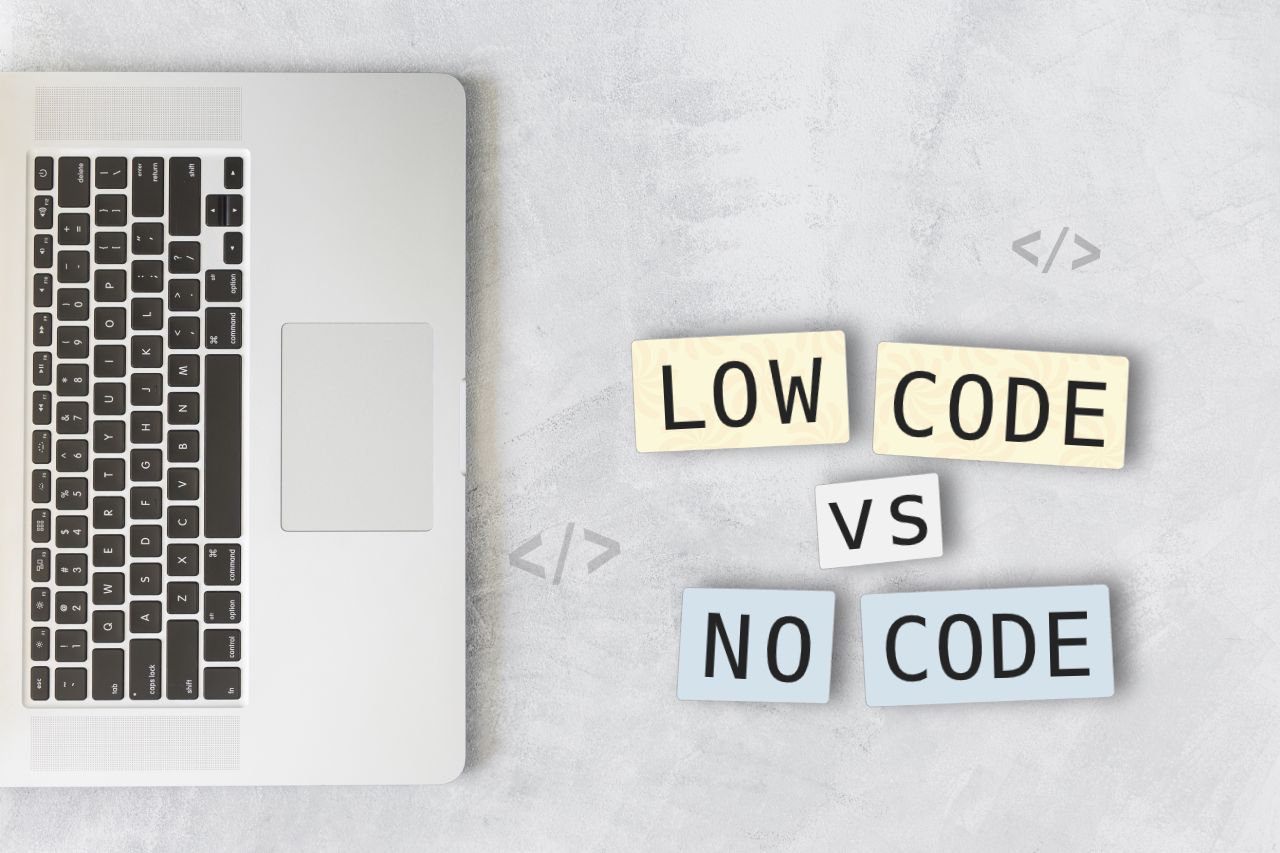Node.js vs Golang: A comparison
Are you an entrepreneur or a senior technology leader in an enterprise undertaking a modern application development project? Obviously, you are dealing with numerous questions concerning how best to execute the project. Selecting the right technology assumes a high priority, where you have many choices! Node.js and Golang are two prominent options, and you might have wondered about which one to use.
Between Go vs Node.js, which one works best for you? Read this Node.js vs Golang comparison where we evaluate both and answer this question.
Node.js: An introduction

Ryan Dahl created Node.js and the first release of this open-source JavaScript-based runtime environment was in 2009. Dahl built this cross-platform runtime environment on the V8 JavaScript engine of Chrome.
Node.js is dynamically-typed as you would expect since it’s built on JavaScript. This runtime environment helps to undertake an entire web app development project with a single programming language.
Node.js also offers high throughput and scalability. Its event-driven architecture and asynchronous I/O help you to create real-time web applications easily.
Since its first release, multiple developments took place around Node.js. At the time of writing, its last stable release is 14.4.0, which came in June 2020.
JavaScript is very popular. At the time of writing this, the TIOBE index ranks JavaScript as the 7th most popular programming language. While this does influence the popularity of Node.js, it’s not the only factor! We will shortly review the advantages of Node.js. For now, suffice it say that the Stack Overflow Developer Survey 2019 concluded that Node.js is the most popular framework.
What is Node.js used for
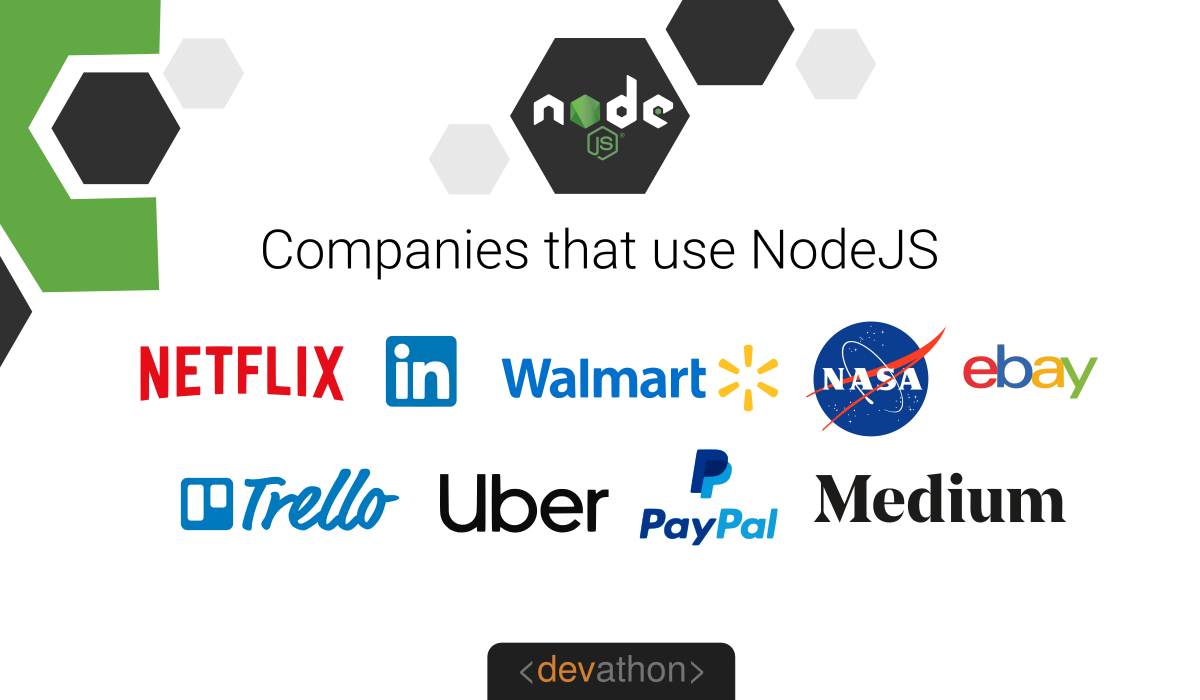
When you think of what is Node.js used for, creating fast network applications easily emerges as a key reason. Node.js applications can scale sufficiently well. This JavaScript-based cross-platform runtime environment helps to create server-side as well as networking applications.
If you are planning to create a real-time web application with two-way connections, then Node.js is a good choice. In this kind of application, you would need a server that doesn’t wait for an API to return data.
Node.js-based servers can meet this requirement. Since Node.js enables asynchronous programming, the Node.js APIs are non-blocking. A Node.js server will call one API, and then it will call another API instead of waiting for the results from the earlier call. Since Node.js helps in event-driven programming, the event mechanism will enable the server to get a response from the 1st API call. This event mechanism helps a Node.js to respond to requests using a non-blocking approach, which helps to create scalable apps.
Moreover, Node.js doesn’t buffer any data. This makes it a good choice for streaming applications. Node.js helps you to create fast applications, which is the result of this runtime environment being built on Chrome’s V8 JavaScript engine.
The following organizations, all leading players in their respective fields, use Node.js:
- Netflix
- Walmart
- Trello
- Uber
- PayPal
- Medium
- eBay
- NASA
The following are some of the prominent Node.js frameworks:
- Express.js
- Koa.js
- Sails.js
- Meteor.js
- Derby.js
- Total.js
- Adonis.js
- Nest.js
Golang: An introduction

A team of software engineers at Google developed Go, and this programming language is also known as Golang. Robert Griesemer, Rob Pike, and Ken Thompson played a key part in designing this open-source programming language. This team first released Go in 2009.
The team that designed and developed Go studied the C language closely. They wanted to retain several strengths of C in the new programming language they were designing. Go features many similarities with C as far as the syntax is concerned. Golang is a statically-typed and compiled programming language.
This programming language helps developers to use memory safely. Managing objects, garbage collection, and support to concurrency are some of its other key features.
Golang has undergone plenty of enhancements, thanks to a vibrant developers’ community. At the time of writing, the latest stable release of Go is 1.14.4. This release came in June 2020.
Golang enjoys significant popularity. At the time of writing this, the TIOBE index for June 2020 ranks Go as the 12th most popular programming language. This index had reported Go as the 15th most popular language in June 2019, which shows that this language is gaining in popularity. The Stack Overflow Developer Survey 2019 shows that Go is 13th most popular technology.
What is Golang used for
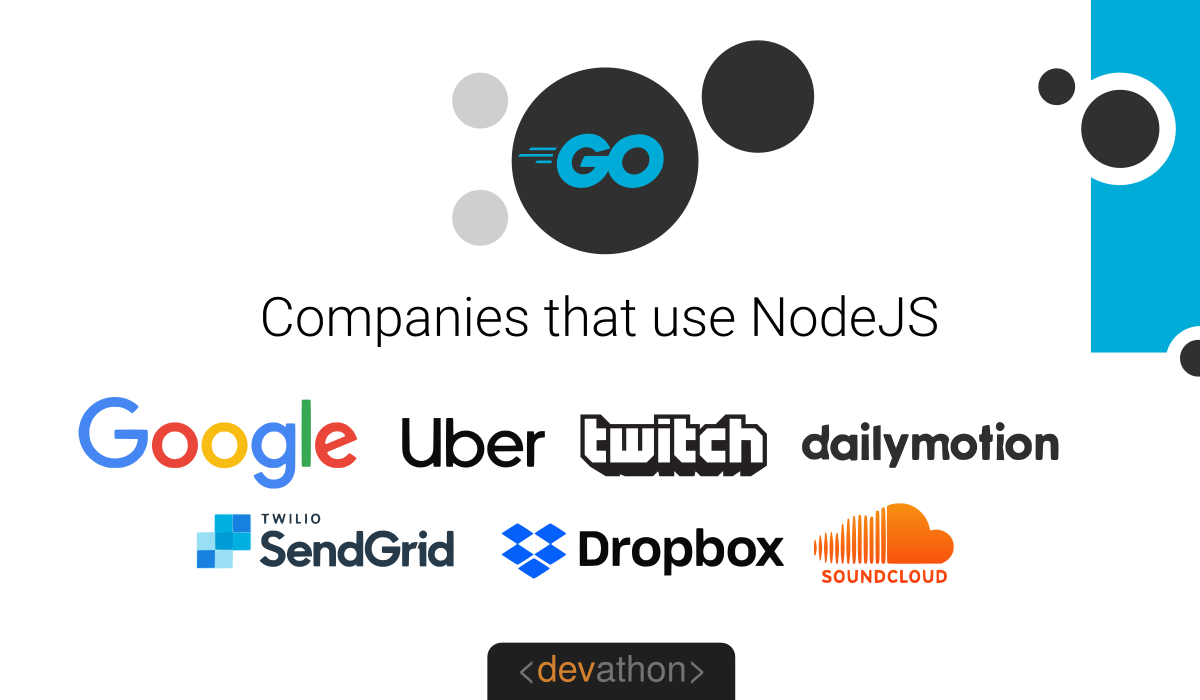
Thanks to its powerful features, you can use Go in a wide range of development projects. Performance is one of the key requirements that come to mind when you think what is Golang used for. It’s a compiled language, and the absence of an interpreter helps Go deliver robust performance. Go utilizes the processor resources of a system effectively, which is another advantage as far as performance is concerned.
Since Golang can effectively manage the allocated memory, it helps you to write reliable apps. Many organizations use Go to develop performant web apps. You can use Go to write APIs and web services. Go has proven its utility in systems programming, network programming, big data development, and machine learning development.
The following major companies use Golang:
- Uber
- Twitch
- Dailymotion
- SendGrid
- Dropbox
- SoundCloud
The following are a few popular frameworks for the Go programming language:
- Gin
- Beego
- Iris
- Echo
- Revel
- Martini
- Buffalo
The pros and cons of Node.js
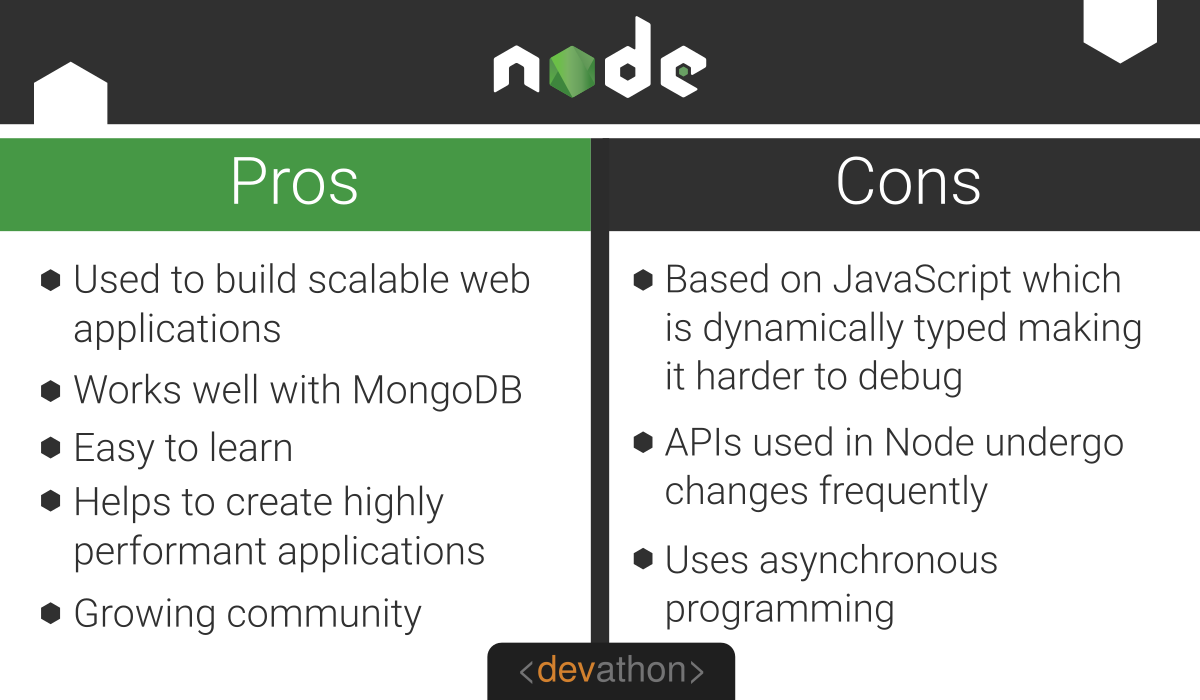
Node.js offers several advantages. These are as follows:
- As we have already explained, Node.js helps you to create scalable web applications. When you think of what is Node.js used for, this emerges as a key use case.
- Node.js is based on JavaScript, which many developers know. For a large number of developers, learning Node.js is quite easy.
- With Node.js, you only use one runtime environment to code both the front-end and back-end of your proposed web application. You are hiring full-stack developers when you hire Node.js programmers.
- Node.js helps you to create highly performant apps, as we have mentioned earlier.
- Node.js makes caching individual modules easier.
- This runtime environment is a good choice for creating streaming apps.
- Apart from being highly extensible, Node.js works very well with MongoDB, the popular NoSQL database.
- A vibrant and growing community supports Node.js. This gives you two advantages. The first is that you get excellent support. The second is that this community has created many excellent open-source tools and frameworks for Node.js. You get a serious productivity boost when you work with Node.js.
There are a few disadvantages of using Node.js too, which are as follows:
- As we have mentioned, Node.js supports asynchronous programming. While that helps it to offer key advantages, it can pose a challenge to developers that aren’t familiar with asynchronous programming. You need to hire developers with appropriate expertise.
- Node.js is based on JavaScript, which is dynamically typed. It’s also weakly typed. Making coding errors related to variable types is common when you use this kind of language. If you have relatively inexperienced programmers, they could find it hard to debug such errors. You need to hire sufficiently experienced programmers that know what they are doing concerning variable types.
- Many APIs used in Node.js undergo changes frequently, which can confuse many developers.
The advantages and disadvantages of Golang
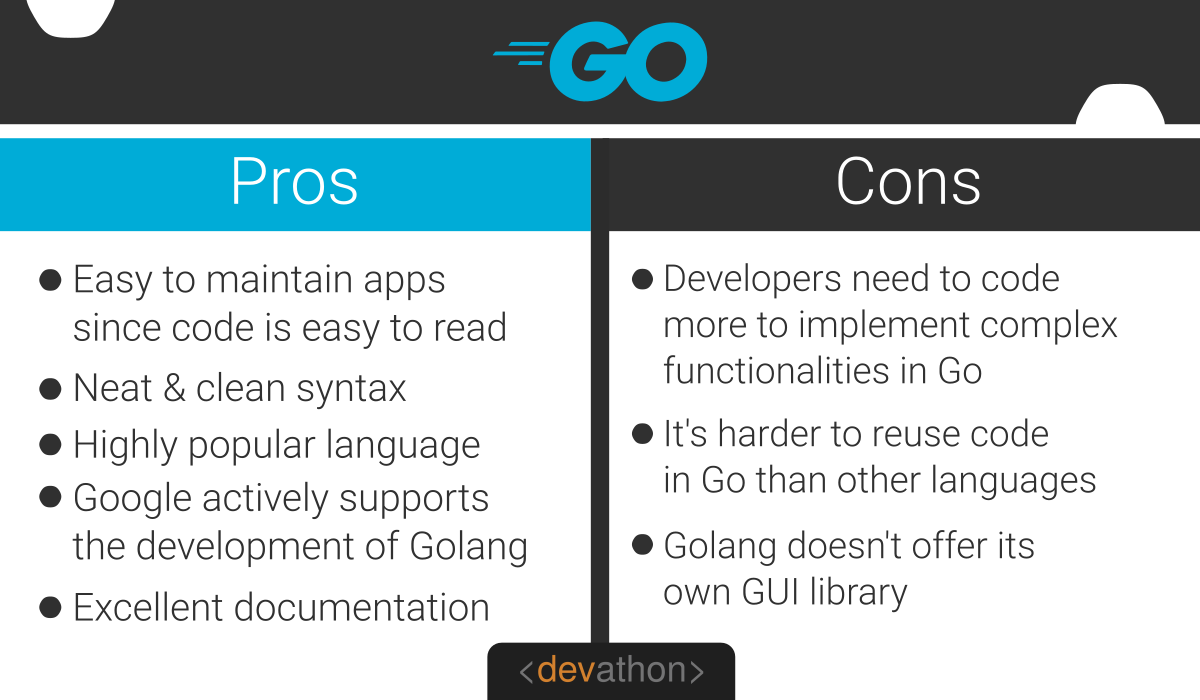
Golang provides several advantages, which are as follows:
- Developers find Go very easy to use since this language features a neat and clean syntax.
- Since Go is gaining in popularity, more developers will learn it. This will make it easier to hire Go developers in the future.
- You will find it easy to maintain apps written in Go since code written in Go is easy to read.
- Go features many similarities with C. Since many programmers know C, C#, or C++, they will find it easy to learn Go.
- Go provides a sophisticated standard library, moreover, this library is easy to use. Programmers don’t need to import complex external libraries or learn such libraries. The Go standard library supports many functions. You can use them to accomplish many tasks, and you don’t need to write complex pieces of code.
- Go helps developers to write bug-free code. Since it’s a statically-typed language, you won’t make those complex errors concerning variable types. Go features an efficient garbage collector and supports safe memory management. All of these factors reduce the likelihood of bugs.
- Go helps to write secure apps, and this advantage strongly relates to how to helps to write bug-free code. In today’s world cyber-criminals are constantly looking for loopholes to explore in software applications. A programming language that reduces the likelihood of errors offers definite advantages.
- Google actively supports the development of Go and the company promotes it. The technology giant uses Go heavily in its projects. You can be sure that Golang will receive the development support it needs.
- Programmers can take advantages of the excellent documentation available for Go. When you write a program in Go and you forget to create sufficient documentation, the language alerts you.
- Go doesn’t need an interpreter since it’s a compiled language. This helps it to deliver a high performance. When you think of what is Golang used for, this comes up as a key factor.
- Go supports concurrency, which helps programmers to build systems with a high degree of parallel processing.
- Go helps programmers to build scalable applications. This programming language helps developers to quickly identify the bottlenecks that could adversely impact the scalability of an application. This provides them with sufficient time to optimize the application.
- Go developers can easily perform a static code analysis of their code using GoMetaLinter, a useful tool.
- Go offers an API that helps developers to test their code. Programmers can use it to start or skip a test, alternatively, they can use it to run parallel tests.
Go has a few disadvantages too, which are as follows:
- Developers need to code more to implement complex functionalities in Go than some leading languages. This language doesn’t provide the kind of complex abstractions that some of the other popular programming languages do. While that makes Go a simple language to use, it limits its versatility.
- Complex programs that are written in Go might consume more computing resources. Such programs have huge file sizes since Go doesn’t have a virtual machine (VM).
- Go doesn’t offer its own GUI library. This means that you will need to spend significant effort to connect a library with your project.
- You will find it harder to reuse code in Go than in other languages since Go doesn’t support generics.
- The developer community supporting Go has less maturity compared to some other leading programming languages.
Node.js vs Golang: A comparison
We now use a few key yardsticks to compare Node.js vs Golang. The comparison is as follows:
- Finding developers: Since Node.js is based on JavaScript and many developers already know it, you can find developers quite easily. You will need more time and effort to find Go developers.
- Learning curve: Node.js involves less learning curve since JavaScript already enjoys massive popularity. Programmers typically have steeper learning with Golang. In the Node.js vs Golang comparison, Node.js is a better choice as far as the learning curve is concerned.
- Maturity: Go undergoes developments and enhancements, however, these follow a systematic pattern. On the other hand, several Node.js APIs undergo frequent changes. This demonstrates a lack of maturity on the part of Node.js. Golang has attained a greater degree of maturity.
- Performance: Go delivers higher performance than Node.js.
- Scalability: While both Node.js and Golang help you to create scalable apps, Golang supports concurrency better. This makes it a better choice to code scalable apps.
- The availability of tools and frameworks: The Node.js developer community has created a wide range of open-source tools and frameworks. This factor helps programmers to achieve higher productivity. In comparison, you will find fewer tools and frameworks for Go.
- Avoiding coding errors: Go is a statically-typed language, which eliminates the scope for variable types-related errors. Node.js is based on JavaScript, which is dynamically-typed. You could find variable types-related errors that are harder to debug.
- Error-handling: Golang requires explicit error-handling. This requires a disciplined and systematic approach to coding, which improves the maintainability. In this aspect, Golang is more preferable to Node.js.
- Deployment: It’s easier to deploy applications written in Go than those written in Node.js.
- Community support: The Node.js developers’ community is wider and more vibrant than the Golang developers’ community.
Go vs Node.js: When to use either of them?
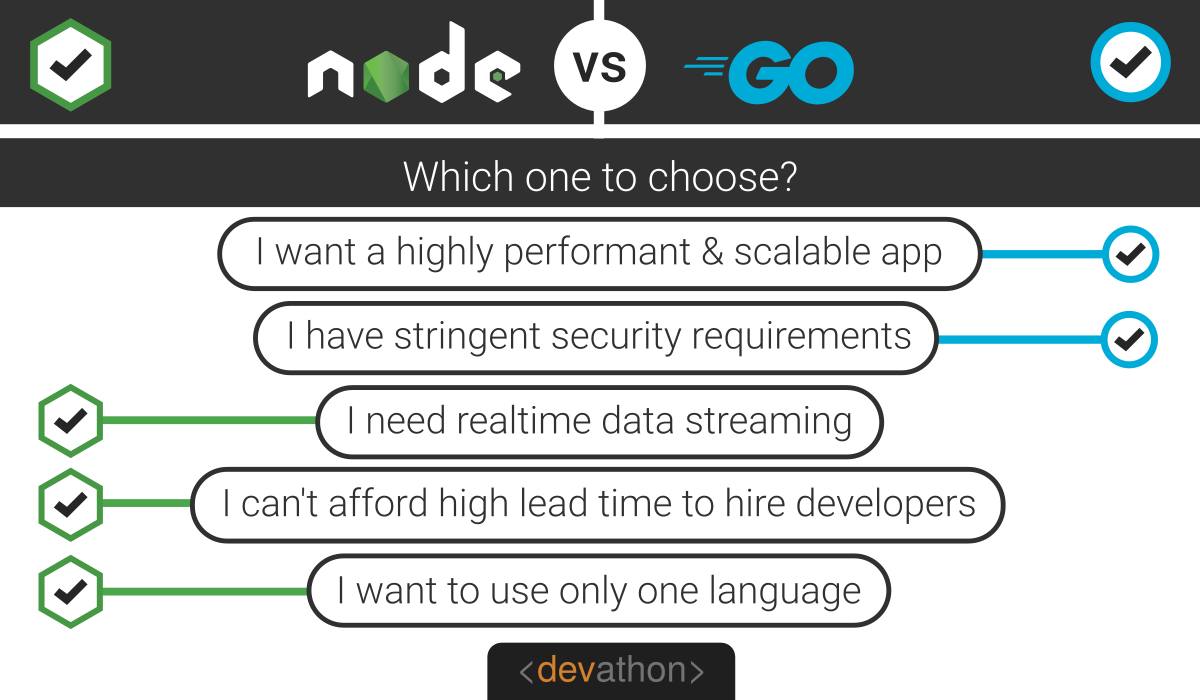
How do you decide whether to use Go vs Node.js? Use the following decision-making factors:
- The lead time to hire Go vs Node.js application developers: If you can’t afford a high lead time to hire developers, then you should choose Node.js. You will find it easier to hire Node.js developers than Golang programmers.
- You want one language only: Node.js development effectively means JavaScript for both the front-end and backend. Node.js offers sufficient tools and frameworks for both front-end and back-end development. In comparison, Go doesn’t have a GUI library and you need to use 3rd party libraries. If you want one set of languages-and-frameworks only for your entire web application development, then you should use Node.js.
- You want a highly performant and scalable application: When you consider what is Golang used for, scalability and performance come to mind. In this Go vs Node.js comparison, Go does better in this regard than Node.js.
- You have stringent security requirements: Go eliminates many common programming errors, therefore, it reduces the application security vulnerabilities. Its robust memory management and garbage collection capabilities make it a better choice than Node.js when you have stringent security requirements.
- You need real-time data streaming: Real-time data streaming is a key use case when you consider what is Node.js used for. In the Node.js vs Golang comparison, Node.does better in this regard.
- You prefer a streamlined set of development, review, testing, and deployment processes: You should use Golang due to its tooling support for static code analysis, testing, and deployment. In the Go vs Node.js comparison, Go represents a better choice in this aspect.
Conclusion
We have analyzed the characteristics of both Node.js and Go. Both of them have distinct advantages and few limitations. We have compared Node.js vs Golang and discussed the various scenarios where you should use one over the other. Analyze your project and business requirements carefully before you make a choice between Go vs Node.js.
Are you looking to get your App built? Contact us at hello@devathon.com or visit our website Devathon to find out how we can breathe life into your vision with beautiful designs, quality development, and continuous testing.





